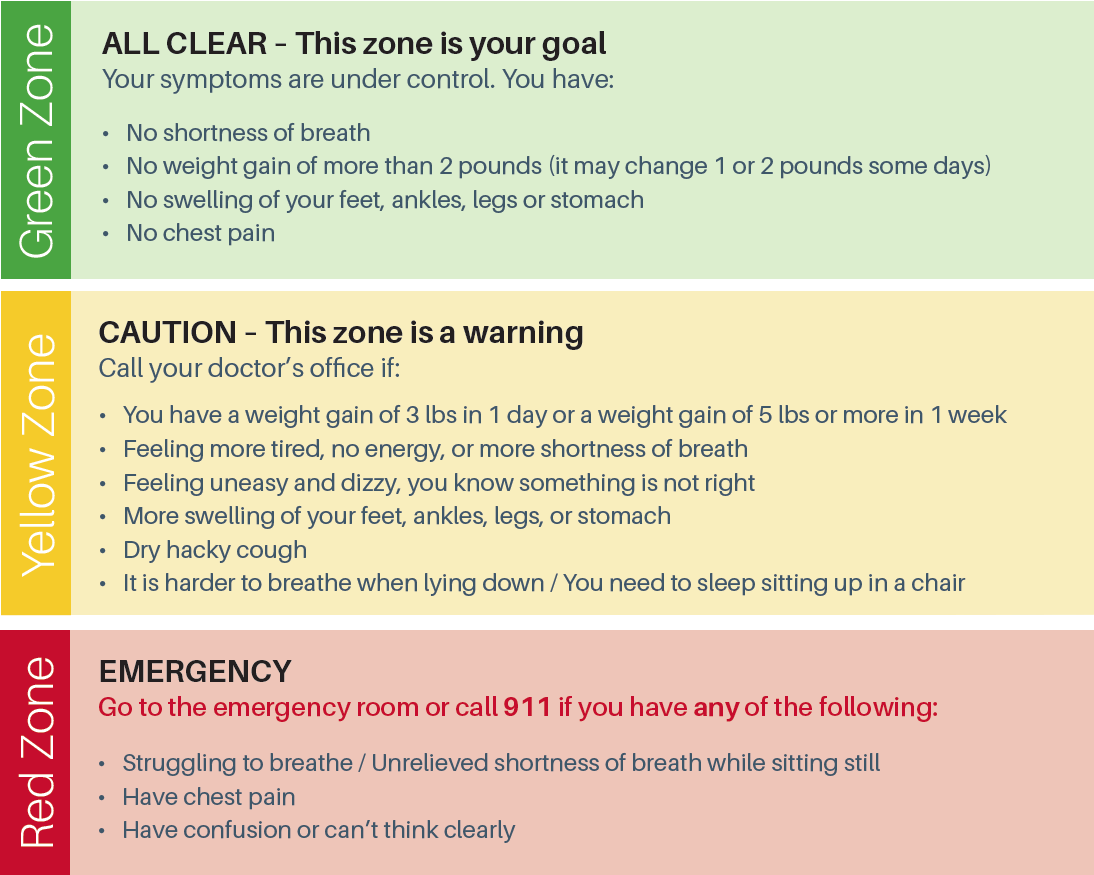Know Your Heart Health Zone
It’s important to check what zone your heart is in every day. Review your symptoms to determine if you are at your goal zone, warning zone or if you need to contact your cardiologist.
Are you in the Green, Yellow, or Red Zone today?
Green Zone
ALL CLEAR – This zone is your goal
Your symptoms are under control. You have:
- No shortness of breath
- No weight gain of more than 2 pounds (it may change 1 or 2 pounds some days
- No swelling on your feet. ankles, legs, or stomach
- No chest pain
Yellow Zone
CAUTION – This zone is a warning
Call your doctor’s office if:
- You have a weight gain of 3 lbs in 1 day or a weight gain of 5 lbs or more in 1 week
- Feeling more tired, no energy, or more shortness of breath
- Feeling uneasy and dizzy, you know something is not right
- More swelling of your feet, ankles, legs, or stomach
- Dry hacky cough
- It is harder to breathe when lying down / You need to sleep sitting up in a chair
Red Zone
EMERGENCY – Go to the emergency room or call 911 if you have any of the following:
- Struggling to breathe / Unrelieved shortness of breath while sitting still
- Have chest pain
- Have confusion or can’t think clearly

Download the Heart Failure Zones
Healthy Hearts
Coronary heart disease is the single leading cause of death in the U.S. It is caused by a condition called atherosclerosis, the narrowing of the coronary arteries due to fatty build-up of plaque.
Understand and use these numbers
Set goals, which may help reduce your risk of heart disease and stroke.
100 Fasting glucose (blood sugar)
Less than 100mg/dl is a normal reading for blood sugar. 100–125mg/dl is considered pre-diabetes and at risk for developing Type 2 diabetes.
0 Smoking
Eliminate all tobacco products and exposure to second-hand smoke.
1 Tsp. salt
Limit salt intake to 1,500 mg per day.
5 Servings fruits & vegetables
High in vitamins, minerals & fiber while low in calories. Eating fruits and vegetables can help control weight & blood pressure.
25 BMI
Body Mass Index measures your weight relative to your height. If that number is higher than 25, you are considered to be overweight, over 30 is considered to be obese and at a higher risk for heart disease.
Waistline: 35”or less for women/40” or less for men
Central obesity, or excessive fat around your abdomen,is strongly associated with Metabolic Syndrome which has a set of risk factors (some listed above) for Heart Disease.
30 Minutes
30 minutes of aerobic physical activity most days of the week to control weight and improve cardiovascular health.
Know your cholesterol numbers
≤150 Triglycerides
A form of fat that is produced in your body and also comes from the food that you eat.
>50 HDL for women / >40 HDL for men
High-Density Lipoprotein (HDL), or good cholesterol, helps remove “bad” cholesterol from the arteries.
≤100 LDL
Low-Density Lipoprotein (LDL), or bad cholesterol, can build up in the walls of arteries when too much is circulating in the blood.
Blood pressure: 120/80 and lower
Considered normal blood pressure. If blood pressure is too high it increases the risk of coronary heart disease, stroke, and kidney failure.
Download Healthy Hearts








